Hindu Wedding: Everything You Need to Know
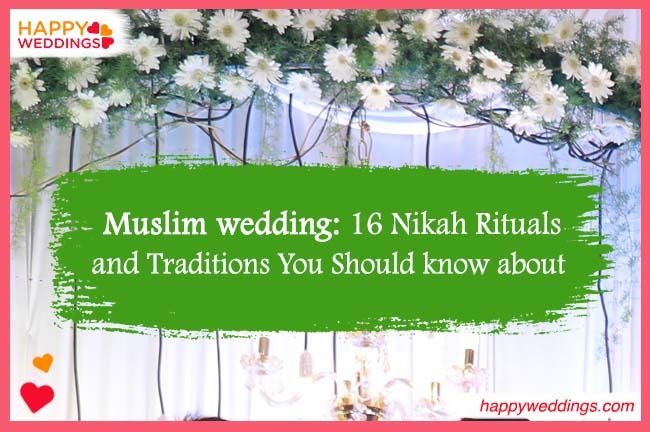
Indian weddings are known for their flamboyance, traditionally connected with enduring yet variable rituals celebrated by different communities across the world. Among them, Muslim Weddings show the vibrance full of joyous and lively wedding celebrations closely associated with rich traditions that have been passed down over the centuries. Since Islam is considered to be one of the most important religions, there are several rituals and customs purely associated with religion when it comes to wedding ceremonies. The interesting part starts from the name itself. Muslim Wedding is known as “Nikah” which is the Arabic word for marriage.
In this blog, we present to you some of the interesting rituals associated with Muslim wedding.
How Significant are weddings in Islamic culture?
Islam considers wedding as the fundamental part of their life as Islamic culture says so. The cultural traditions associated with Muslim Wedding dates back to the centuries and these traditions differ from other communities across the globe.
Once the marriage proposal is initiated either by relatives or friends, it is followed up by both the bride’s and the groom’s family.
However, in this modern world, people would rely completely on trustworthy matrimonial websites to find their perfect match as it has become an easy mode of matchmaking.
If the boy and the girl agree with each other, relatives from the boy’s family visit the girl’s family to confirm whether the girl is a suitable match for the boy. Similarly, elders from the girl’s side visit the boy’s family to confirm the same and the marriage is fixed then.
Like every other wedding ceremony, the Muslim wedding is being categorized into pre-wedding, wedding, and post-wedding rituals. We have clubbed all the rituals so that it would be easy for you to identify.
1. Salatul Istikhara (A form of prayer)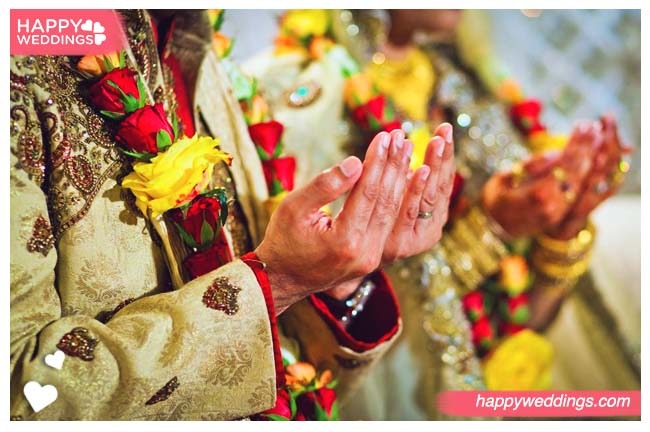
The first and foremost pre-wedding ritual, Salatul Istikhara is a form of prayer associated with the marriage in which the Imam (Chief Priest) prays for the couple to seek the blessings of the almighty.
This Muslim wedding ritual can also be considered as an official announcement prior to the wedding.
2. Imam Zamin (Groom’s mother’s visit)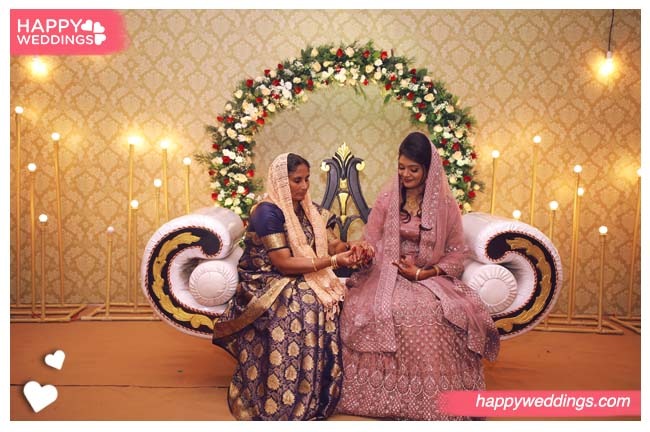
Salatul Istikhara is followed by Imam Zamin in which the groom’s mother visit the bride’s home.
While visiting, she carries gifts as well as sweet delicacies along with a gold or silver coin.
Wrapped in a silk cloth, the coin will be tied around the bride’s wrist so that it signifies her official acceptance into the groom’s family.
3. Mangni (Engagement)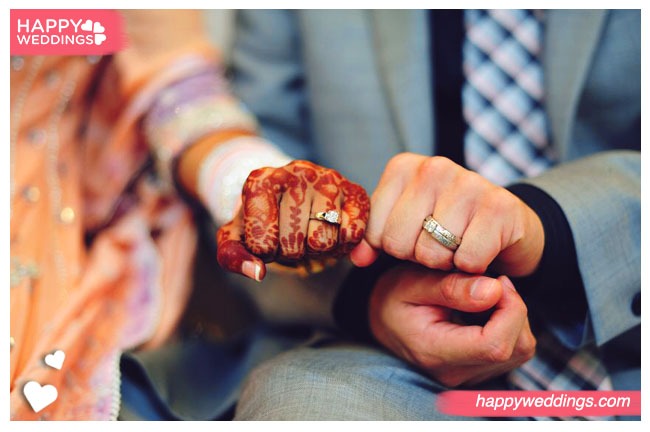
Mangni officially means engagement. It is celebrated in the presence of the families of the bride and groom along with close relatives and friends.
The bride and the groom exchange the rings on this auspicious day while the family and friends shower them with blessings as well as valuable gifts.
Through this ritual, the bride and the groom officially get engaged to each other.
4. Manjha or Haldi Ceremony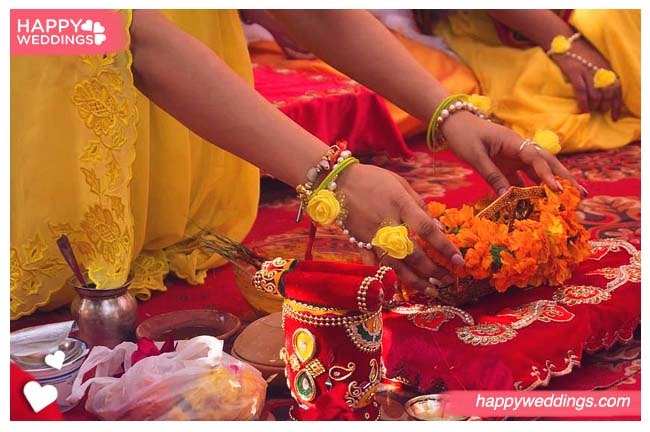
Prior to the actual wedding date, two days before to be precise, family and friends gather to celebrate this ritual where the bride would be dressed in yellow attire.
A paste made of turmeric, sandalwood, and rosewater will be smeared over the face, hands, and feet of the bride.
All the women members in the family partake in this fun-filled activity and they apply the paste to the bride’s face turn by turn.
After the ritual is finished, the bride will have a bath in the holy water. Once the ritual is done, the bride is not supposed to leave her house till her wedding day.
5. Mehndi (Women-centric celebration)
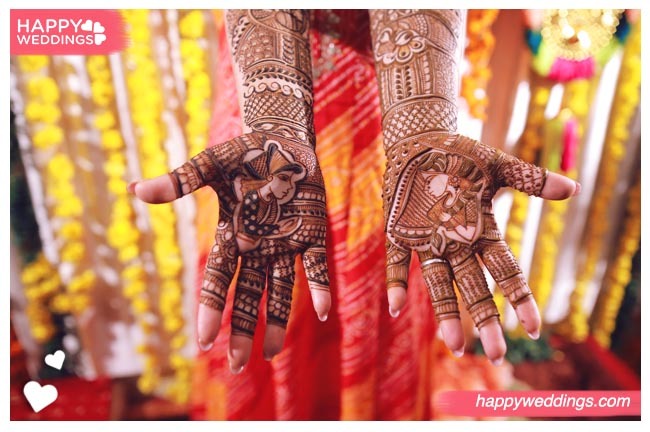
Mehndi is one of the most important and unavoidable part of Muslim Wedding.
It is also a women’s celebration. Almost all of the lady folks from the bride’s family gather to celebrate this ritual.
The one who is creative will be assigned with the task of applying the latest and trendy mehndi designs on the bride’s hands and feet.
The mehndi designer cleverly scribbles the initials of the groom that will be hidden inside the design.
The task is for the groom as he has to find the initials during the wedding night.
6. Sanchaq
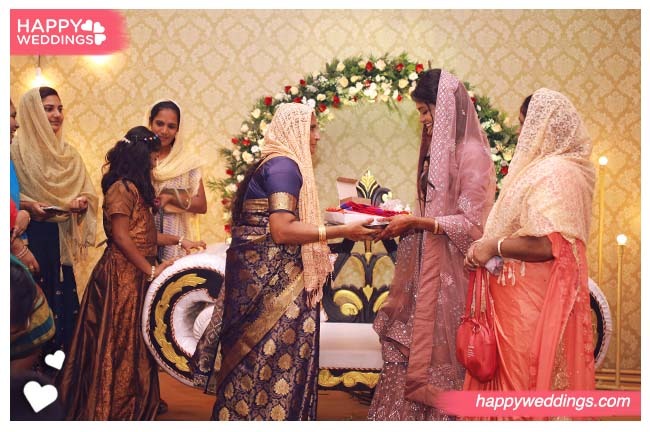
Another prominent Muslim pre-wedding ritual in which the members (especially males) visit the bride’s family.
During the visit, the members carry gifts and sweets along with a bridal outfit which the bride wear during the wedding day.
Accessories and jewelry are also given to the bride as a gesture of love and affection by her future-in-laws.
7. Baraat (A grand procession)
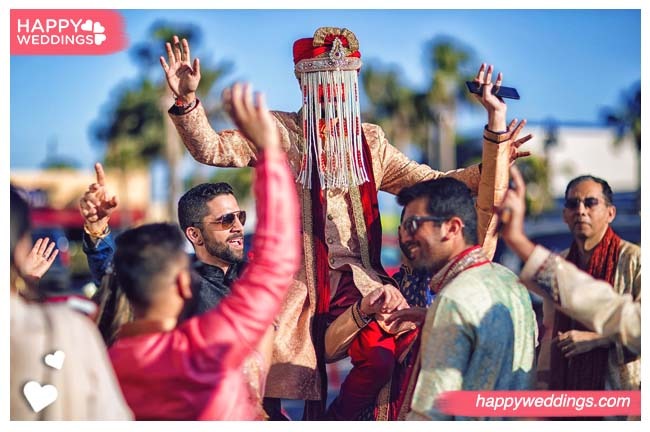
Baraat literally means procession.
When it comes to the Muslim Wedding ceremony, it is truly an exciting, loud, and the vibrant event celebrated on the wedding day.
As part of this ritual, the groom enters the venue in a decorated car and he is escorted by his relatives and friends.
A member of the bride’s family also joins the party as part of this custom. The ritual is celebrated to declare that the wedding is going to happen soon.
Also Read: Hindu Wedding: Everything You Need to Know
8. Welcoming the Bride
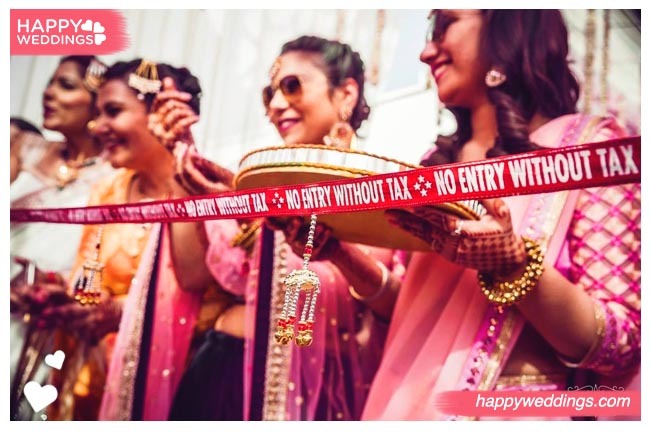
The groom and his family are warmly welcomed by the bride’s family members at the wedding venue.
He is offered sweet drinks by the bride’s family for which his brother-in-law gives the company.
The bride’s family members also spray attar or rosewater on the groom to make an amazing pathway for him.
9. Nikah (The wedding ceremony)
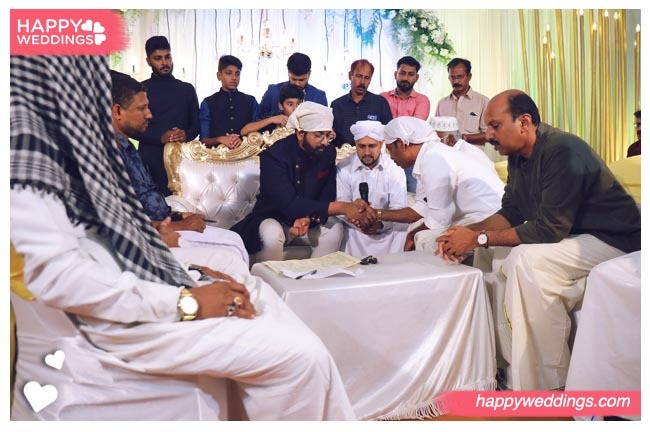
One of the primary wedding rituals during Muslim Weddings, Nikah (marriage) is officiated by a Maulvi.
During the ritual, men and women are allowed to seat in separate groups. Men will sit around the groom while women take their seats around the bride.
The bride’s father will be the ‘Wali’ (guardian) of the bride to take care of the bride’s interest.
The Maulavi recite prayers from the holy Quran. He then asks the bride and the groom whether they are willing to marry each other. Once they agree, the marriage contract is signed.
As part of Nikah, there are other rituals performed such as Mehr, Ijab-e-Qubool, and Nikah Nama.
10. Mehr
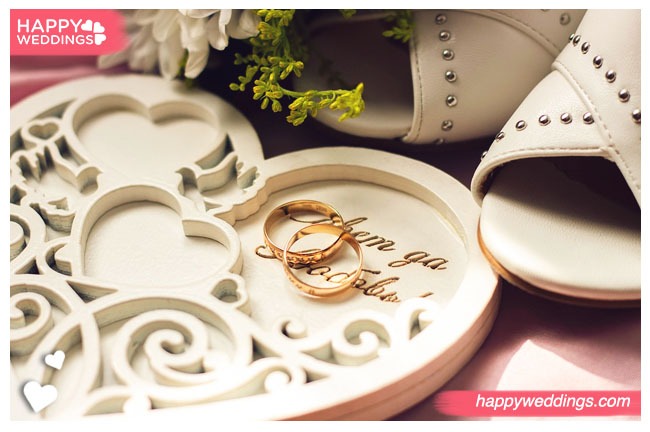
After the Nikah, the bride receives Mehr, a form of dowry for the marriage.
It is believed to be a mandatory custom that signifies a promise from the groom to the bride’s father that he would take care of her wife.
Another interpretation of this custom is that the groom is rewarding the bride’s parents for taking such good care of his bride.
11. Ijab-e-Qubool
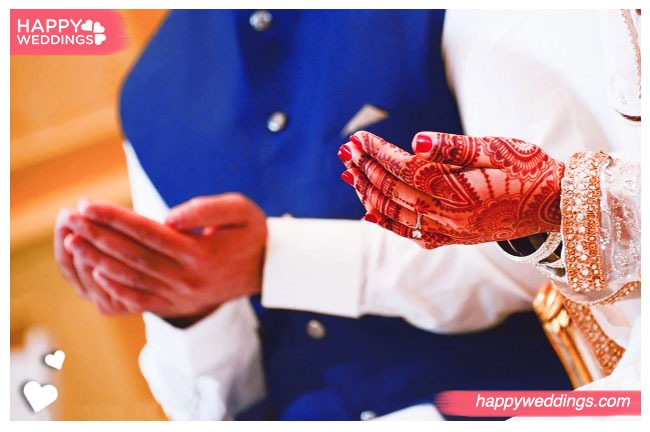
It is one of the most significant wedding day rituals.
During the wedding, the bride and the groom are seated separate and the Maulavi asks them their consent to marry each other.
As the answer, the bride and the groom have to say “Qubool hai”, meaning I accept thrice to confirm their consent.
12. Nikah Nama (Signing marriage contract)
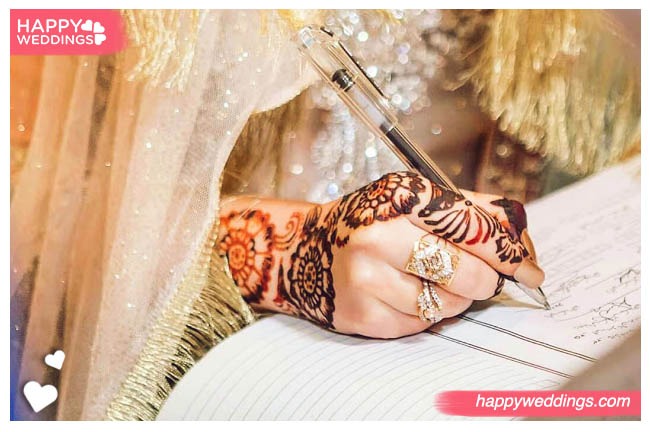
Nikah Nama is the official marriage contract signed after Maulavi asks for the consent of the bride and the groom.
It is being done in the presence of two witnesses, each from both families.
After signing the official contract, prayers from the Quran are recited and the elders from both the families confer blessings to the newly wedded couple.
13. Arsi Mushraf
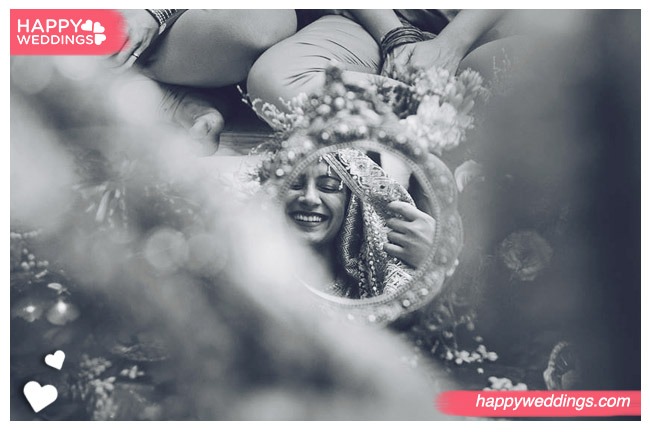
This is one of the interesting Muslim wedding rituals in which the bride and groom look through a mirror kept in between them. This is performed after the wedding ceremony. However, it is still considered as part of wedding rituals.
14. Rukhsat (Bride bids adieu)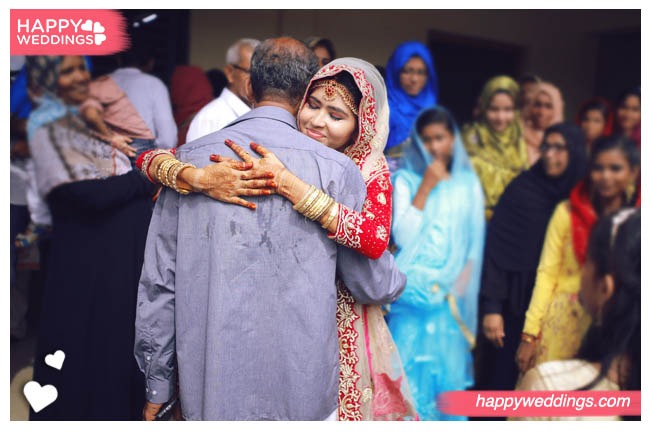
After the pre-wedding and wedding ceremonies, there are a few post-wedding rituals to be performed.
The first one among them is Rukhsat in which the bride says goodbye to her family. She then enters her new house (the groom’s house) where she is warmly welcomed while the elders recite prayers from Holy Quran.
15. Walimah (Reception)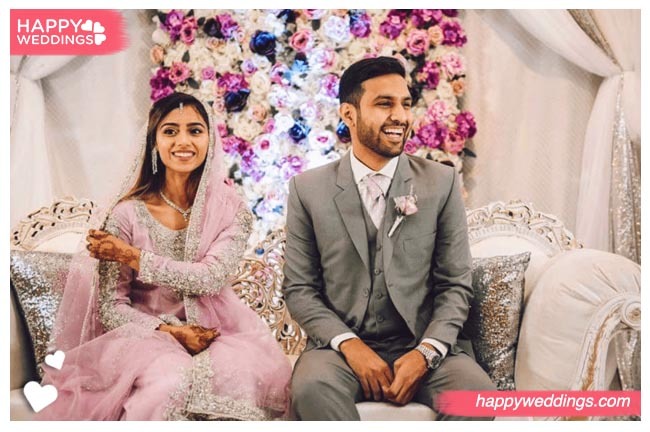
Walimah is a reception party that officially declares that the wedding has been done.
During the party the bride groom is treated royally and the bride is being introduced to the groom’s relatives and friends. The invitees offer gifts to the newly wedded while enjoying the party by having lots of fun and music.
16. Chauthi (Visiting bride’s house)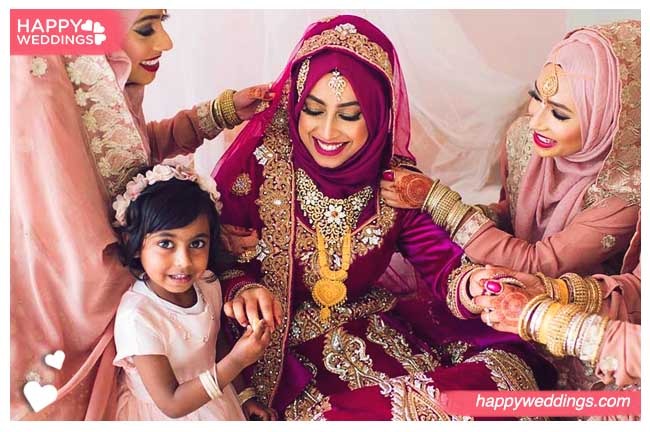
After the wedding ceremony, the bridegroom visits the bride’s family and this custom is named as Chauthi.
This happens on the fourth day of the wedding.
The family members of the bride greet the couple by serving sweets and offering gifts. They serve an extended feast to the couple marking the end of Muslim Wedding rituals and traditions.
Wedding Attire
The wedding day is absolutely a special day for bot the bride and the groom and hence they prefer to be stylish and trendy in vibrant attire. Brides most often choose to wear Salwar Kameez, Saree, or Sharara.
Also Read: Kerala Wedding: Interesting Traditions and Rituals
Meanwhile, grooms wear Kurta and Pajama. Few embroidery works will be preferred on the kurtas. However, grooms today are behind varied trends and they wear Sherwani or some other form of attire.